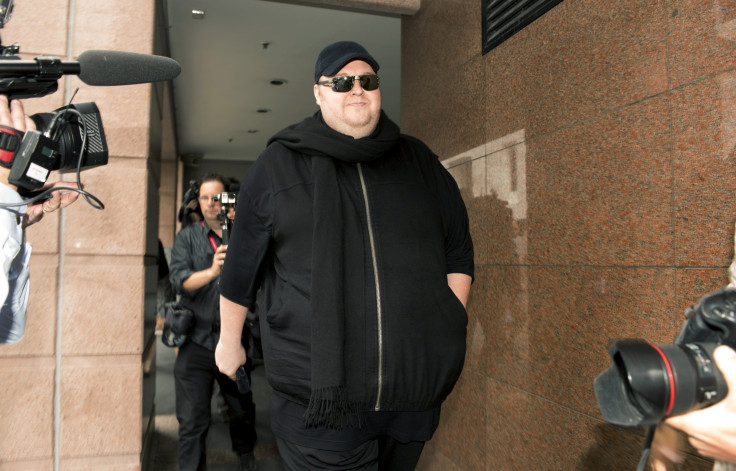Kim Dotcom On US Extradition Ruling By New Zealand High Court: ‘We Won But We Lost Anyway’

The High Court of New Zealand ruled Monday that Kim Dotcom could be extradited to the United States, but not on the copyright infringement charges the U.S. wants to bring against the tech entrepreneur. The extradition is legal under the country’s laws on the basis of the charges of fraud that are also levied by the U.S. against Dotcom, the court said in its ruling, which his legal team said will be appealed.
The ruling makes clear that it is no longer the “largest criminal copyright case,” a statement by Dotcom’s lawyers said, referring to an observation by Justice Murray Gilbert, who reportedly said: “Online communication of copyright protected works to the public is not a criminal offence in New Zealand.”
However, the judge added that the fraud charges against Dotcom, as well as three others — Mathias Ortmann, Bram van der Kolk and Finn Batato — are sufficient grounds for extraditing them to the U.S. to face criminal proceedings.
On Twitter, Dotcom reacted to the bittersweet judgment.
Extradition Judgement in a nutshell:
— Kim Dotcom (@KimDotcom) February 20, 2017
We won but we lost anyway ⚖️🚽
Judgement: I'm no longer getting extradited for Copyright. We won on that. I'm now getting extradited for a law that doesn't even apply.
— Kim Dotcom (@KimDotcom) February 20, 2017
High Court Judgement: New Zealand Parliament wasted years and millions of taxpayer money on a Copyright Act that is now no longer relevant.
— Kim Dotcom (@KimDotcom) February 20, 2017
And he also targeted the “political” nature of the ruling.
Judges who prioritize political views and career over impartiality and the law shouldn't be Judges at all.
— Kim Dotcom (@KimDotcom) February 20, 2017
Why not become a politician?
It's a political case.
— Kim Dotcom (@KimDotcom) February 20, 2017
It's a political judgement.
I told you I can't be extradited for Copyright and I was right.
What is this? Sharia law?
Both Dotcom and his legal team are confident of winning the appeal, which they will make in the country’s Court of Appeal. Their argument is, in essence, that if copyright infringement isn’t a crime under New Zealand laws, then it can’t be treated as fraud either. It rests on a decision from the country’s parliament which said internet service providers could not be held responsible for the actions of their users. The charges against Dotcom stem from users of his now-defunct Megaupload website illegally sharing copyrighted content, such as music and videos.
New Zealand Copyright Law (92b) makes it clear that an ISP can't be criminally liable for actions of their users. Unless you're Kim Dotcom?
— Kim Dotcom (@KimDotcom) February 20, 2017
“The last hurdle to what we say is the correct outcome - no extradition - will now need to be determined by the Court of Appeal. We remain confident that this last point, which would prevent extradition in this complex and unprecedented legal case, will be resolved in Kim's favour in a manner consistent with Parliament’s intent, international law and, importantly one might think, the United States' own law,” his lawyers said in a statement.
The U.S. Supreme Court has ruled that copyright charges can't be fraud charges. Let's just ignore that minor detail over here in New Zealand
— Kim Dotcom (@KimDotcom) February 20, 2017
U.S. authorities say Dotcom and other Megaupload executives encouraged piracy through their website, which cost film studios and recording companies over $500 million. Dotcom has maintained that a lot of legitimate files were shared on the website, and that with about 50 million active users every day, it wasn’t possible to monitor and control everyone’s activities on it.
And he ended his day on Twitter on a rather confident, upbeat note.
Don't worry. Be happy. 🎧
— Kim Dotcom (@KimDotcom) February 20, 2017
I'll never be extradited.https://t.co/OF9AUBxT46
Just as every night I'm going to bed with a smile, cuddling my lovely fiancé, and looking forward to an awesome tomorrow. No worries 😉
— Kim Dotcom (@KimDotcom) February 20, 2017
In late August 2016, the same judge had allowed the hearing of the case to be live-streamed over YouTube, turning down U.S. opposition to the public broadcast.
© Copyright IBTimes 2024. All rights reserved.





















